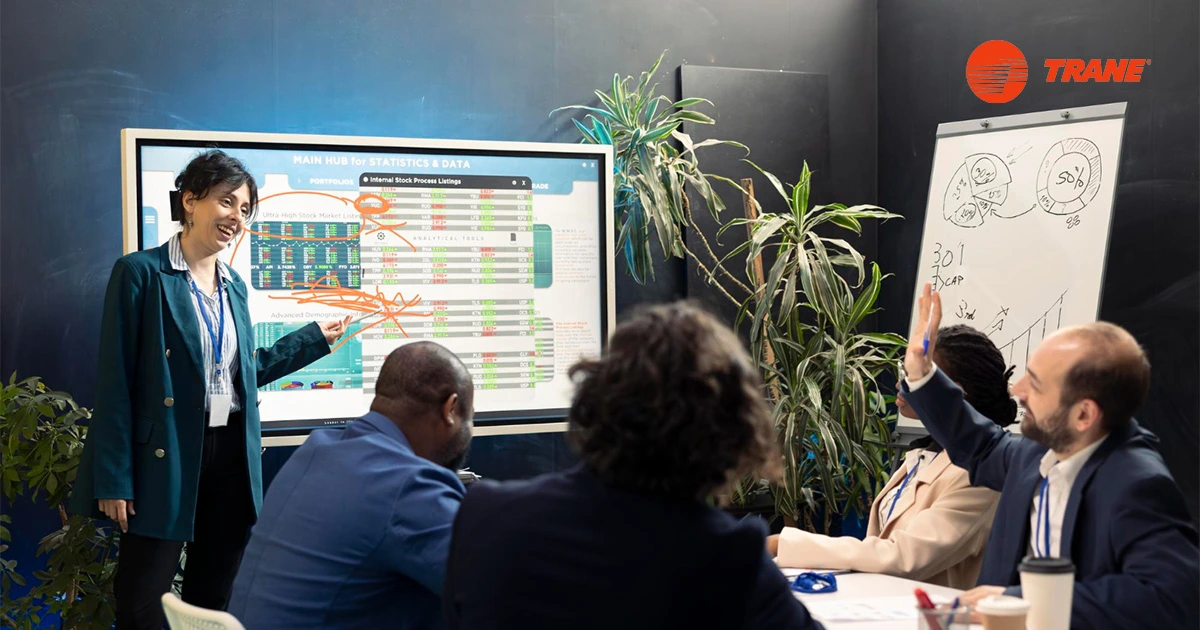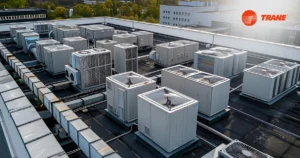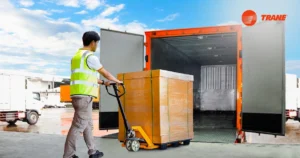Organizing large-scale events in the Kingdom demands absolute precision. Whether it is Riyadh Season, a global investor forum, or a televised sporting spectacle, climate control can decide the outcome. In peak summer, ambient temperatures often exceed 40°C, and humidity spikes along the coast challenge indoor comfort, production schedules, and food safety. To avoid costly disruptions, organizers turn to chiller rental backed by Trane engineering, site planning, and round-the-clock support.
Understanding event climate risks in Saudi Arabia
Saudi venues range from temporary outdoor stages on the Red Sea to vast indoor halls in Riyadh. Heat gain from crowds, lighting, and equipment can overwhelm permanent systems, while remote sites may lack the electrical and water infrastructure required for high-capacity cooling. The economic stakes are significant, since lost ticket revenue, spoiled inventory, and broadcast penalties can multiply quickly. A resilient rental strategy protects schedules, reputation, and margin.
How Trane designs the right system
Trane begins with a heat-load assessment that accounts for occupancy, envelope conditions, solar exposure, and ventilation needs. From there, engineers size equipment, determine distribution methods, and right-size power and water needs. The result is an integrated plan that installs quickly, scales cleanly as attendance changes, and meets safety and compliance requirements, including local regulations and venue standards.
Deployment speed and reliability
Events operate on immovable timelines. Trane’s project managers coordinate transport, craning, rigging, and commissioning, then hand off to on-site technicians who monitor performance, handle change requests, and maintain uptime. Remote monitoring and predictive maintenance help prevent issues before they affect guests or production.
Guest experience and air delivery
Comfort is not just a number on a thermostat. Air distribution, noise control, and dehumidification must align with seating plans, VIP areas, and media zones. Mid-event adjustments are common as crowds shift, doors open, and weather changes.
Enhancing attendee satisfaction
Targeted comfort cooling improves circulation and humidity control in high-density spaces, helping keep guests engaged, staff productive, and vendors operating efficiently without overconditioning the entire venue.
Energy efficiency and sustainability alignment
Efficient equipment, variable-flow pumping, and optimized setpoints reduce energy use while maintaining stable conditions. Trane teams tune systems to minimize start-up spikes, manage demand during peak utility windows, and recover efficiency overnight. For organizers pursuing ESG goals, measured performance and post-event reporting provide evidence of reduced consumption, supporting sustainability narratives aligned with Vision 2030.
Power and utilities coordination
Successful events require early coordination with utilities and venue owners. Trane helps plan temporary power distribution, water supply, and condensate management to avoid conflicts with stage builds, security zones, and pedestrian routes. Clear cable paths, labeled manifolds, and safe equipment setbacks shorten installation time and reduce rework.
Noise, placement, and community considerations
Acoustic targets matter for live entertainment and broadcast. Trane evaluates equipment placement, barrier options, and air-handler selection to meet sound limits without compromising airflow. Proper placement also preserves guest sightlines and emergency egress.
Food safety and thermal assurance
Caterers and vendors depend on tight temperature control. Trane supports thermal mapping during commissioning, validates holding conditions, and provides digital logs for compliance teams. Consistent temperatures reduce waste, reinforce hygiene protocols, and protect brand standards.
Case snapshot from the coast
At a coastal gala, evening humidity surged as sea breezes shifted inland. Trane teams adjusted airflow patterns, increased dehumidification upstream, and recalibrated setpoints to stabilize comfort across VIP seating and back-of-house areas. The program stayed on time, and post-event reviews recorded higher guest satisfaction.
Cost transparency and commercial clarity
Event budgets move quickly, so procurement teams need line-of-sight to costs. Trane provides clear proposals, including equipment lists, power needs, delivery schedules, staffing plans, and contingency options. Transparent change-order processes keep finance and production aligned as conditions evolve.
Health and safety management
Safety is integral to every decision on-site. Trane teams plan equipment clearances, spill containment, and traffic separation, and they coordinate with venue HSE on permits, fueling windows, and fire watch coverage. Cable routing, signage, and lighting are designed to reduce trip hazards, while lockout procedures and shift handovers keep operations controlled during late-night changeovers and high-traffic turnovers.
Training, handoff, and post-event reporting
Before opening, Trane briefs venue and production staff on operating ranges, escalation paths, and safe reset procedures. During the run, daily check-ins review performance, weather forecasts, and program changes. After strike, a concise report summarizes energy use, runtime, incidents, and recommendations for future seasons.
Conclusion
For organizers who want resilience, budget control, and a great guest experience, Trane provides turnkey solutions that scale to the size and complexity of Saudi Arabia’s marquee gatherings. From first site walk to final strike, the goal is seamless performance that protects revenue and brand equity, reinforced by responsive teams and proven processes that deliver under pressure. With the flexibility of temporary air conditioning, planners can adapt to shifting requirements, seasonal extremes, and evolving program needs without compromising comfort or uptime.




